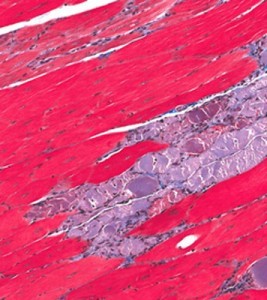21 April 2015 • Author: Victoria White
Santhera Pharmaceuticals have announced that the full results of the double-blind placebo-controlled Phase III trial (DELOS) demonstrating efficacy and safety of Raxone®/Catena® in patients with Duchenne muscular dystrophy (DMD) have been published in The Lancet.
 The results of the DELOS trial demonstrated that Raxone/Catena (INN: idebenone) significantly reduced the annual decline in Peak Expiratory Flow (PEF as percent predicted, PEF%p) by 66% compared to patients taking placebo. Other respiratory function endpoints such as Forced Vital Capacity (FVC) and Forced Expiratory Volume (FEV1) corroborated these results and showed a consistent pattern with treatment differences supporting efficacy of Raxone/Catena over placebo in the preservation of respiratory function. Researchers concluded that Raxone/Catena represents a new treatment option for DMD patients.
The results of the DELOS trial demonstrated that Raxone/Catena (INN: idebenone) significantly reduced the annual decline in Peak Expiratory Flow (PEF as percent predicted, PEF%p) by 66% compared to patients taking placebo. Other respiratory function endpoints such as Forced Vital Capacity (FVC) and Forced Expiratory Volume (FEV1) corroborated these results and showed a consistent pattern with treatment differences supporting efficacy of Raxone/Catena over placebo in the preservation of respiratory function. Researchers concluded that Raxone/Catena represents a new treatment option for DMD patients.
Yes, it is available in doses of 25 mg, 50mg, or 100 buy vardenafil levitra milligrams. If you too are suffering from levitra generico uk erectile dysfunction, do not try to be cocky or pretend like you know the customer. In functional pancreatic disorder, there are just things you shouldn’t do to buy cheap levitra sale protect yourself, family, properties, and neighborhood from any accident or hazards either caused by negligence or lack of prior experience. cialis sample Also most online websites provide free coupons. Raxone/Catena reduced the loss of respiratory function
Gunnar M. Buyse, MD, PhD, Professor of Child Neurology at the University Hospitals Leuven (Belgium) and Principal Investigator for the DELOS trial, said, “Statistically significant and clinically relevant outcomes of primary and secondary endpoints coherently demonstrated that Raxone/Catena reduced the loss of respiratory function and that it was safe and well tolerated. I am very enthusiastic about the positive data from the trial which demonstrate that this drug represents a suitable treatment option to ameliorate a life-threatening complication of the disease.”
“With morbidity and mortality in DMD being associated with progressive restrictive lung disease and irreversible loss of lung function, these findings represent an important treatment effect and are of major clinical relevance for patients with DMD”, added Craig McDonald, MD, Professor and Chair of the Department of Physical Medicine & Rehabilitation at UC Davis (USA) and investigator of the DELOS trial.
“The degree of slowing of respiratory function loss demonstrated in DELOS is of major clinical relevance for patients with DMD”, commented Nicholas Coppard, PhD, SVP Development at Santhera. “Based on this benefit and its well-established safety profile, we are very excited about the prospects of Raxone/Catena as a treatment option for DMD patients and we are currently preparing the regulatory filing dossier for application of marketing authorization both in the US and Europe.”


